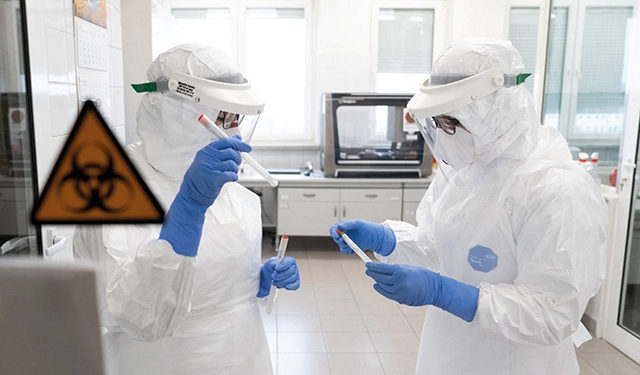The epidemiological situation in Georgia has been significantly deteriorating, with an average of over 1000 new cases and up to 10 deaths now being reported daily, climbing since lockdown restrictions were lifted. This naturally results in increased concern among the public and epidemiologists, with expectations high of a repeat lockdown.
However, health officials this week have been assuring Georgian society that there is no need for a systemic lockdown at this stage, and only targeted restrictions might need to be imposed.
On April 14, the Head of the National Center for Disease Control and Public Health (NCDC), Amiran Gamkrelidze, urged citizens again to observe COVID-19 rules to avoid tougher restrictions.
“We don’t want to face strict restrictions, so, we must adhere to the recommendations: wear a face mask, avoid large social gatherings and get the vaccine,” he stated on Wednesday, going on to confirm again that Georgia is facing its third coronavirus wave.
Georgian capital Tbilisi, Samegrelo-Zemo Svaneti, and Adjara have recorded a high number of daily cases, while the remaining regions also show increasing dynamics in this regard.
During Wednesday’s meeting of the Interagency Coordination Council, Health Minister Ekaterine Tikaradze presented a plan for speeding up the vaccination program, with priority groups for vaccination being gradually expanded.
The Council, emphasizing the worsening epidemiological situation, reiterated the need for citizens to be scrupulous about observing regulations, to ensure against the need to introduce tougher restrictions. Of enormous importance in this context, they say, are facemasks, social distancing, and avoidance of large gatherings, including social events prohibited by the law.
On the Prime Minister’s instructions, relevant agencies are enforcing strict control over the implementation of all regulations, in order to flatten the curve.
The Georgian government is also working actively to get hold of an additional one million Pfizer jabs.
The Statistics
The NCDC unveiled the coronavirus vaccine takers rate this week, saying that 23,493 people had received the COVID-19 jab in Georgia so far. The Center urged more citizens to book vaccine appointments via the platform booking.moh.gov.ge, or by calling hotline 1522.
Georgia reported 1030 coronavirus cases, 706 recoveries, and 7 deaths on Thursday.
Georgian capital Tbilisi recorded the highest number of 538 Covid-19 cases within the last 24 hours, followed by the Samegrelo-Zemo Svaneti region with 119 cases, and the Adjara region with 103 cases.
The total number of confirmed cases since the outbreak of COVID-19 in the country has reached 292,244, among whom 279,389 people recovered and 3908 died.
The daily test-positivity rate stands at 3.14%, while it was 2.68% over the past 14 days.
Presently, there are 8947 active cases of coronavirus in the country, 155 of them in government-assigned quarantine facilities, 2616 in hospital, and 394 asymptomatic and “mild symptom” patients are being treated at government-assigned treatment facilities.
Opening the borders
Despite the increase in domestic corona cases, and in respect of the more active vaccination campaigns being carried out abroad, Georgia is going ahead with its recovery plans and opening the borders
Initially, recommendations were set that “Citizens of all countries traveling by air from any country may enter Georgia if they present a document (a Covid Passport) confirming the full course (two doses) of any COVID-19 vaccination at the border checkpoints of Georgia.”
Yet, entry rules for visitors from India have been tightened due to the pandemic. Effective April 15, the above rule will not apply to those traveling from India, regardless of their citizenship. Such visitors will be required to present a negative PCR test taken within the 72 hours before arriving in Georgia, even if they have a Covid Passport. After crossing the border, they will then be subject to compulsory self-isolation and repeated PRC testing within three days (72 hours), at their own expense. Further, based on a government decree, incoming students from the Republic of India will enter Georgia only by charter flight.
The epidemic situation in India has been deteriorating, having this week hit a record high overnight number of Covid-19 infections worldwide.
Resuming flights
The Ministry of Economy reported that Hungarian low-cost airline WizzAir will resume some flights from Kutaisi International Airport starting April 18.
WizzAir is expected to resume operation with flights to Warsaw and Vilnius on April 18. Flights are set for once a week initially, and will become more frequent later.
From May, WizzAir flights will also be carried out to Riga and Dortmund, while, from July, to 13 more countries in Europe.
From Tbilisi International Airport, from July 21, Eurowings will be connecting passengers to Düsseldorf from 89.99 Euros. The Lufthansa subsidiary is to launch three new direct connections starting in July, flying passengers from Düsseldorf to Russia for the first time, to Ekaterinburg and Krasnodar in southern Russia, as well as to the Georgian capital Tbilisi.
The new routes will be operated by Airbus A320. On Wednesdays and Sundays, it will take off from the capital of North Rhine-Westphalia to Georgia. Return flights to Düsseldorf are to be offered on Wednesdays and Sundays.
Wednesday: DUS – TBS, 11:45 a.m. – 6:00 p.m.; TBS – DUS, 6:50 p.m. – 9:30 p.m.
Sunday: DUS – TBS, 07.15 a.m. – 1.30 p.m.; TBS – DUS, 2.20 p.m. – 5.00 p.m.
The flight times are local times and can be booked online already.
By Team GT














